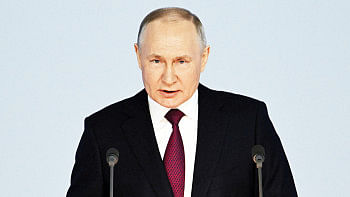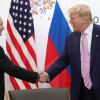A war of egos that continues to devastate

Today marks one year since Russia advanced into Ukraine with assaults by sea, land, and air – giving way to what many have opined are the worst war-borne consequences since the Second World War. And – as we did in this column on February 26, 2022 – we reiterate our condemnation for Russia's invasion of Ukraine, which continues to cause blisters of conflict and tension all over the world. No doubt, the conflict that began a year ago had been in the making for over a decade. But the fact that it has been allowed to escalate to the point of such a wide-spanning war speaks to our collective failure to prioritise peace.
The human cost of this war in particular is unjustifiable, with the UN High Commissioner for Human Rights recently deploring that at least 8,006 civilians have died and 13,287 have been injured over the past 12 months. To say nothing of the dire ways in which this war has disrupted the livelihoods of the affected citizens. And the situation now only seems to be getting worse.
Just on Tuesday, President Vladimir Putin declared that Russia is suspending participation in the New START nuclear arms reduction treaty with the United States, accusing the West of being directly involved in attempts to attack its strategic air bases. Signed between President Obama and President Medvedev in 2010, the treaty is the last remaining nuclear arms control pact between the two countries which collectively hold 90 percent of the world's nuclear warheads.
The stoking of the fire by the West is undeniable. In particular, its practice of not heeding Russia's security concerns has been a constant. But, at the end of the day, the onus is squarely on Russia for resorting to such intense and unfaltering aggression in the first place instead of exploring all the available avenues of peace.
And now, as all had predicted, the tremendous effects of this war in Europe continue to spill over into the rest of the world, with common citizens of many countries, including Bangladesh, having to face hiked prices of essential commodities that threaten to choke them to poverty. Essentially, the consequences of this war have pushed millions more towards devastatingly lower living standards just as economies were preparing to somewhat recover from the pandemic. Meanwhile, it has been disappointing to see some nations, especially those bordering Russia, egging on the perpetuity of violence rather than trying to encourage dialogue.
Still, we must demand that this war reach a peaceful conclusion before even more damage is inflicted upon innocent citizens. The international community, instead of sticking to sides, must push for resolution. War is never good news for any party involved, and this has been starkly exemplified by the current financial collapse being experienced worldwide. As always, it is only through dialogue and compromise that lasting and necessary peace can be achieved.

 For all latest news, follow The Daily Star's Google News channel.
For all latest news, follow The Daily Star's Google News channel. 










Comments